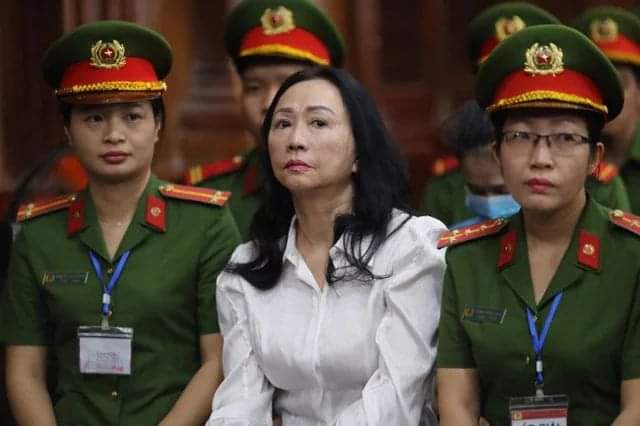Fall of a Titan: The $27 Billion Fraud That Rocked Vietnam
In one of the most dramatic legal battles in Vietnam’s history, Truong My Lan, a once-celebrated real estate magnate, now stands condemned to death. The 68-year-old founder of Van Thinh Phat Holdings faces the ultimate punishment for her role in an elaborate financial scheme that defrauded Saigon Joint Stock Commercial Bank (SCB) of a staggering $27 billion. This scandal has not only shaken Vietnam’s financial sector but also exposed the vulnerabilities of unchecked corporate power.
A Network of Deception
Truong My Lan’s empire, built on lucrative real estate deals and influential connections, crumbled when investigators unearthed the extent of her fraudulent activities. Over a decade, Lan manipulated SCB by creating a network of ghost companies that siphoned off funds through fraudulent loans. Prosecutors revealed that Lan effectively controlled more than 90% of the bank’s shares, far exceeding legal limits. Through proxies and shell corporations, she facilitated over 2,500 illegal loans, draining the bank’s resources and leaving thousands of investors in financial ruin.
The scandal reached a critical point in October 2022 when SCB collapsed, triggering a state bailout. The losses, estimated at 6% of Vietnam’s GDP, sparked public outrage and led to calls for accountability at the highest levels. As part of a broader anti-corruption campaign, Lan’s case became emblematic of the government’s resolve to crack down on financial misconduct.
The Trial and Verdict
Lan’s trial, held in Ho Chi Minh City, captivated the nation. For five weeks, prosecutors laid out a damning case, detailing how Lan’s fraudulent activities eroded public trust and destabilized the financial sector. Despite her attempts to repay some of the stolen funds and her emotional plea for leniency, the court was unswayed. The judge handed down a death sentence, citing the severity of the crime and its far-reaching impact on Vietnam’s economy.
During her final remarks, Lan expressed regret, lamenting her decision to venture into banking. “I was foolish to enter the cutthroat world of banking, a sector I knew little about,” she said. Her words, however, did little to mitigate the court’s judgment. The case has since become a symbol of the risks associated with unchecked financial ambition and the government’s commitment to rooting out corruption.
Anti-Corruption Campaign and Political Implications
Lan’s downfall is a significant milestone in Vietnam’s ongoing anti-corruption drive, known as the “Blazing Furnace” campaign. Spearheaded by Communist Party General Secretary Nguyen Phu Trong, the campaign aims to purge corruption at all levels of government and industry. Lan’s conviction follows the resignation of several high-profile officials, including former President Vo Van Thuong, underscoring the campaign’s wide-reaching impact.
The “Blazing Furnace” initiative has gained both praise and criticism. Supporters argue that it is essential for restoring public trust and ensuring accountability. Critics, however, caution against potential overreach and the use of high-profile cases as political tools. Lan’s appeal, currently underway, will test the judiciary’s impartiality and the government’s commitment to due process.
Public Reaction and Future Implications
The public’s reaction to Lan’s case has been mixed. While many applaud the government’s efforts to combat corruption, others express concerns about the fairness of the trial and the severity of the sentence. Death sentences in economic crimes are rare globally, making Lan’s case particularly noteworthy. Human rights advocates have also weighed in, calling for a reconsideration of capital punishment in such cases.
As the court prepares to rule on Lan’s appeal, the outcome will have significant implications for Vietnam’s financial sector and anti-corruption efforts. If the sentence is upheld, it will serve as a stark warning to others in positions of power. However, a reduction in her sentence could signal a more lenient approach, potentially sparking further debate about the balance between justice and deterrence.
In the end, Truong My Lan’s story is a cautionary tale of ambition, greed, and the consequences of abusing power. Her fate now lies in the hands of the court, but her legacy will undoubtedly shape Vietnam’s corporate governance and legal landscape for years to come.
Peoplesmind


